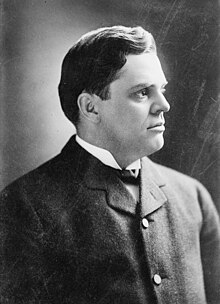Charles S. Deneen
Charles S. Deneen | |
|---|---|
 | |
| United States Senator from Illinois | |
| In office February 26, 1925 – March 3, 1931 | |
| Preceded by | Joseph M. McCormick |
| Succeeded by | J. Hamilton Lewis |
| 23rd Governor of Illinois | |
| In office January 9, 1905 – February 3, 1913 | |
| Lieutenant | Lawrence Sherman John G. Oglesby |
| Preceded by | Richard Yates |
| Succeeded by | Edward F. Dunne |
| State's Attorney of Cook County, Illinois | |
| In office 1896–1904 | |
| Preceded by | Jacob J. Kern |
| Succeeded by | John J. Healy |
| Member of the Illinois House of Representatives from the 2nd District | |
| In office 1892–1894 Serving with Michael McInerney, Robert McMurdy | |
| Preceded by | Michael McInerney, William J. Kenney, H. Dorsey Patton |
| Succeeded by | Rudolph Mulac, Oscar L. Dudley, Sherman P. Cody |
| Personal details | |
| Born | Charles Samuel Deneen May 4, 1863 Edwardsville, Illinois |
| Died | February 5, 1940 (aged 76) Chicago, Illinois |
| Political party | Republican |
| Spouse(s) | Bina Deneen |
| Children | 4 |
| Relatives | Jason Beghe (great-grandson) |
| Education | McKendree College Union College of Law |
| Profession | Attorney |
| Signature |  |
Charles Samuel Deneen (May 4, 1863 – February 5, 1940) was an American attorney and politician who served as the 23rd Governor of Illinois, from 1905 to 1913. He was the first Illinois governor to serve two consecutive terms totalling eight years. Notably, he was governor during the infamous Springfield race riot of 1908, which he helped put down. He later served as a U.S. Senator from Illinois, from 1925 to 1931. Deneen had previously served as a member of the Illinois House of Representatives from 1892 to 1894. As an attorney, he had been the lead prosecutor in Chicago's infamous Adolph Luetgert murder trial.
Life and career[]
Deneen was born in Edwardsville, Illinois, to Samuel H. Deneen and Mary Frances Ashley.[1] He was raised in Lebanon, Illinois, and graduated from McKendree College in Lebanon in 1882. He subsequently studied law at McKendree and at Union College of Law, while supporting himself by teaching school. He was admitted to the Illinois bar in 1886.[2] On May 10, 1891, he married fellow Methodist Bina Day Maloney in Princeton, Illinois.[2] The couple had four children; Charles Ashley, Dorothy, Frances, and Bina.[3]
His political career began soon thereafter, with election to the Illinois House of Representatives in 1892.[1] Deneen was State's Attorney in the late 1890s. In 1896 Deneen appointed Ferdinand Lee Barnett as the first black assistant state's attorney in Illinois upon the recommendation of the Cook County Commissioner . Deneen and Barnett worked together closely for the next two decades.[4]
Deneen supported passage of the Illinois anti-lynching law in 1905. The state had not had many instances of lynchings, but in 1909 Will James was murdered in a spectacle lynching attended by a mob of 10,000 in Cairo, Illinois. The crowd also lynched Henry Salzner, a white man, who had allegedly killed his wife. The governor sent in National Guard troops to suppress violence. Under the 1905 state law, Deneen dismissed Sheriff Frank E. Davis for failing to protect James and Salzner and resisted local efforts to have the officer reinstated.
In 1924, Deneen defeated first-term Senator Joseph Medill McCormick in the Republican primary for the United States Senate. Illinois at that time customarily had a downstate seat and a Chicago-area seat, which McCormick held. McCormick committed suicide in early 1925, for which his widow Ruth McCormick (a future U.S. Representative) blamed Deneen. She defeated him in the 1930 Republican primary, but lost the November election to James Hamilton Lewis. In 1928 Deneen's home was bombed during an outbreak of violence among rival political factions in Chicago in advance of the Pineapple Primary election.[5]
Deneen died in Chicago on February 5, 1940, and was interred there in the Oak Woods Cemetery.[3][6] The public Deneen School of Excellence was named in his honor. It is located in south Chicago next to the Dan Ryan Expressway, not far from Al Capone's former home on South Prairie.
Deneen's great-grandson is actor Jason Beghe.[7]
References[]
This article incorporates facts obtained from: Lawrence Kestenbaum, The Political Graveyard
- ^ Jump up to: a b "DENEEN, Charles Samuel". Biographical Directory of the United States Congress. Retrieved June 21, 2013.
- ^ Jump up to: a b Illinois Blue Book. State of Illinois. 1919. p. 349.
- ^ Jump up to: a b "Ex-Senator Chas. S. Deneen Dies at 76". The Burlington Free Press. Chicago. AP. February 6, 1940. p. 10. Retrieved December 17, 2020 – via Newspapers.com.
- ^ Finkelman, Paul, ed. Encyclopedia of African American History, 1896 to the Present: From the Age of Segregation to the Twenty-first Century, Five-volume Set. Oxford University Press, USA, 2009. p137-138
- ^ [1]
- ^ "Chas. Deneen Succumbs From Heart Ailment". Streator Daily Times-Press. Chicago. AP. February 6, 1940. p. 1. Retrieved December 17, 2020 – via Newspapers.com.
- ^ Wagner, Curt (January 8, 2014). "Chicago P.D.' cast members feel at home'". Redeye.
External links[]
 Media related to Charles S. Deneen at Wikimedia Commons
Media related to Charles S. Deneen at Wikimedia Commons
- 1863 births
- 1940 deaths
- Governors of Illinois
- American prosecutors
- Illinois Republicans
- People from Edwardsville, Illinois
- Republican Party state governors of the United States
- Republican Party United States senators
- Members of the Illinois House of Representatives
- United States senators from Illinois
- Northwestern University Pritzker School of Law alumni
- McKendree University alumni
- Illinois lawyers
- People from Lebanon, Illinois

